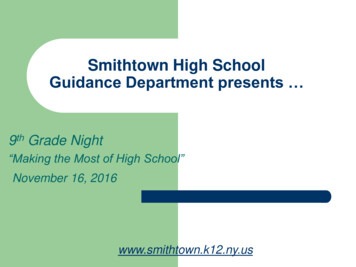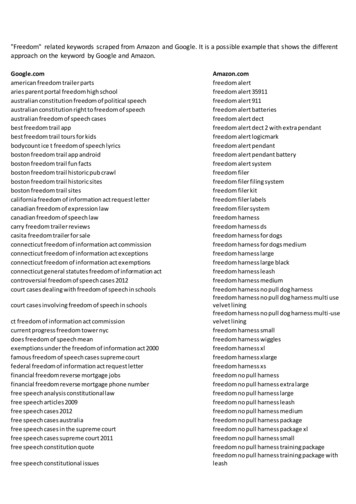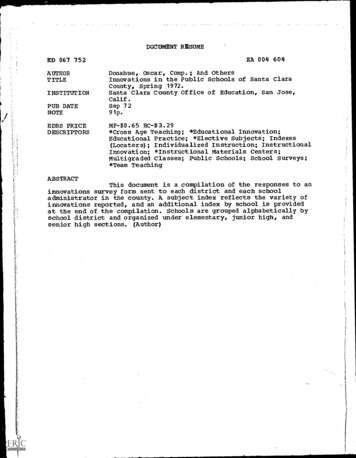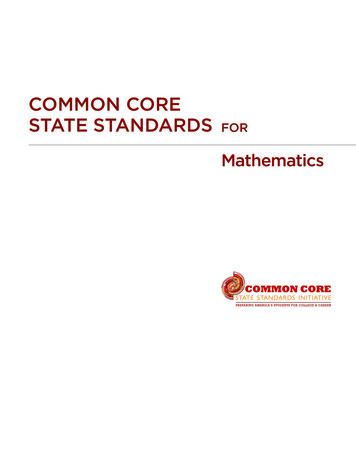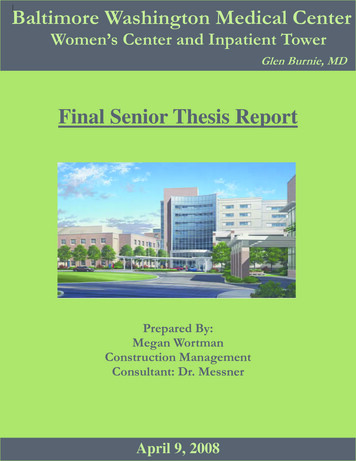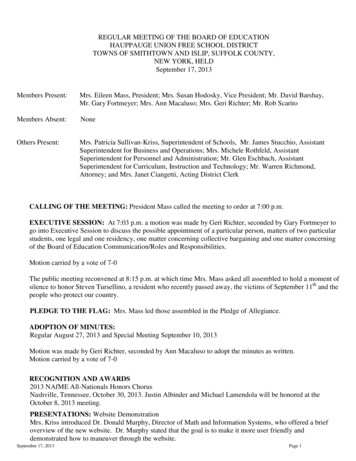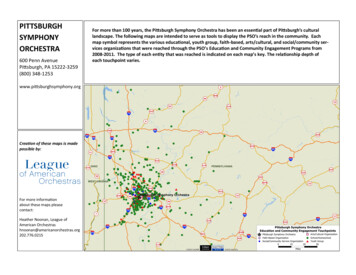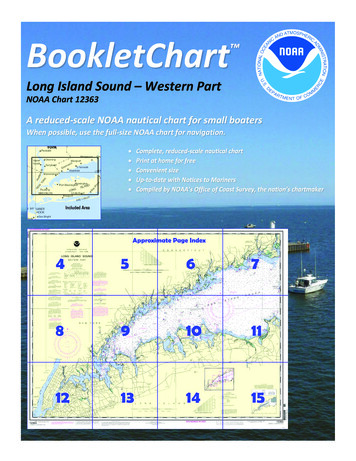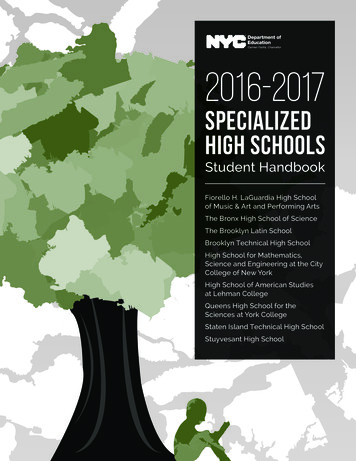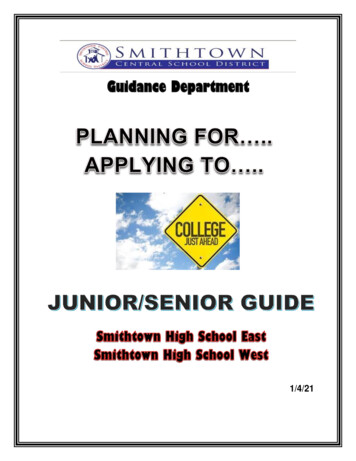
Transcription
Guidance Department1/4/21
Due to Covid -19:Some of the programs listed in this book may be handled virtually2
JUNIOR YEAR CALENDARSMITHTOWN EAST CEEB CODE: 335001 SMITHTOWN WEST CEEB CODE: 335221October Attend Financial Aid Night Build your resume on Naviance Take the PSAT Attend Mini College Day December Start scheduling college visits and tours for during school break January Wilson Tech Student Orientation Use Method Test Prep (paid for by the district) located on your Castle Learning account to prepfor the SAT/ACT College entrance exams. Consider enrolling in SAT/ACT preparation programs for upcoming exams or purchasebooks/programs for preparation at home Complete college search programs on Naviance and compile list of prospective schools Review PSAT results and access self-assessment tools on College Board website Check dates registration for SAT , SAT Subject Tests, ACT and register for upcoming exams Select a strong senior year program Individual junior conferences begin February Check dates registration for SAT , SAT Subject Tests, ACT and register for upcoming exams March Attend Mini College Day Plan activities for summer months such as volunteering, summer job, summer college programs Begin researching scholarship opportunities Consider taking SAT Subject Tests if you are planning on applying to highly competitive schools Attend Annual Smithtown College Fair Wilson Tech Visit April Check registration deadline for SAT , SAT Subject Tests, ACT Read and research information on colleges Take time to visit colleges during Spring break May AP Exams Continue to research and visit colleges Check registration deadline for SAT , SAT Subject Tests, ACT In Naviance, submit Student Profile Survey. You must also have a resume in Naviance. June Regents Exams Points to Remember Continue with meaningful activities: volunteer work, summer educational programs, part-timeemployment, research programs and internships Attend college fairs and plan college visits Obtain college applications, begin drafting college essays and create an activity resume over thesummer NCAA Clearinghouse release forms can be submitted to the Counseling Center at the end of 11thgrade year. Compile a list of potential schools that include safety, target and possible reach schools. Enter college information on Naviance (“Colleges I am Thinking About”) and complete theFERPA waiver Refer to College Testing Calendar (guidance website) for College Testing Invites to National Honor Society (3.75 GPA) are mailed to eligible students. 3
PLANNING FOR COLLEGEBeing admitted to the college of your choice will depend upon a combination of several factors.Some of these factors are: your entire high school record (grade point average, final grades) the strength of your high school transcript. Senior year courses and grades count! your resume of extracurricular activities – clubs, sports, work experience, communityservice, leadership opportunities, honors and awards, etc. your scores on standardized tests: SAT Reasoning exam, SAT Subject Tests, ACT exam the specific high school curriculum required by the college of your choice the recommendation of your high school counselor and teachers an admissions interview with a college representative, if required your college essay(s) the amount of money you have or will be able to access to finance the tuition the amount of planning and research you have done in selecting the appropriate college(s)for you. special talents and abilities Successful planning is a complex task; it does take time and effort. If you work diligently at thistask, you will find that this will greatly enhance your chances of being happy and successful in thecollege you ultimately choose to attend.Make use of the resources available to you. You should know what is going on, ask questions,check websites, listen to daily announcements, visit colleges, speak with admissionsrepresentatives and speak to your school counselor.4
Build a resume on NavianceBuilding a resume on Naviance must be completed for your counselorto write a letter of recommendation)You can build multiple resumes, i.e. for teacher, counselors to use as anaid for writing letters of recommendations, college entrance, sports, for ajobRegister for Family Connection (You received your registration code andlogged in during the 10th grade Career Exploration programYou will need a personal registration code and email account to create your Family Connectionaccount. Please use the code you received in tenth grade during the career exploration program. Ifyou haven’t already registered, you can go to Smithtown High School Westhttp://connection.naviance.com/shsw or http://connection.naviance.com/shse for Smithtown HighSchool East, type your registration code into the New User text box, click Register, and thenfollow the on-screen instructions.Select the items that apply to you and complete them one at a time(Instructions on the next page) Helpful tips for some of the sections: Objective: (Not needed at this time for college resume but would use for work resume)Summary: Not needed at this timeWork Experience: list any jobs you have during HSEducation: XXXXXXX High School, XXXXXXX, NYVolunteer Service: List any service you do inside and outside of school during HS yearsExtracurricular Activities: List any clubs you are involved in inside and outside of schoolduring HS yearsAwards/Certificates: Keep track of all awards you receive. If you received anythingsignificant before HS, you can add that. Otherwise, keep it to your HS years.Skills/Academic Achievements: List any type of recognition you earn in HS, and also listany special skills you have that make you standout. This is the section National HonorSociety goes in.Music/Artistic Achievements: List if you have anyReferences: You can put your school counselor as a referenceAdditional Info – Not needed at this time5
6
7
TIPS FOR VISITING A COLLEGE Plan your visit ahead of time. Try to visit colleges when they are in session. Weekday visitsare best, but weekend and summer visits are beneficial. Remember, don’t base your decisionon one visit or solely on what your tour guide presents. Make an appointment for a visit by calling or registering on-line. Take your parents with you. Compare notes with them after your visit. Complete schoolinformation sheet (see pg. 8). But remember – you have to feel that the school is a good matchfor you. Determine how far the campus is from town. Does this matter to you? If possible, sit in on a class related to your major and evaluate student reactions to the class.Notice the size of the class. What is the attitude of students? Is the class taught by a full-timeprofessor or a teaching assistant? Laboratory facilities – Is the Lab large enough? Does it have modern equipment? Are thereresearch facilities? Try to tour the department of your major. If available, speak to professors. Dorms – How is dorm location in relation to classes? What is the room size? How areroommates selected? Do they offer apartment dorms or two to a room? Would you like to spendfour years here? Are there places for snacks, coffee and laundry facilities? Is housingguaranteed for four years? Dining - Plan to eat on campus during your visit to sample the selections. Discuss availablefood plans. Social Life - How do students spend weekends? What does the college newspaper seem toemphasize - sports, cultural events or politics? Check school website for events on campus. Fraternity & Sorority Life - How important is this on campus? What percentage of studentsbelong? What other clubs or associations are of interest? Sports – Division I or II? Inter-collegiate or intramural? What are you looking for? What placedo sports have in the life of the college? How are the facilities? Library – How available is the library for student use? What are the library hours? 8
What is the retention rate? – How many students return after freshman year? (a 75% return rateis the national average) How many students commute to the campus? Is it mainly a commuter campus or do moststudents live on campus? Career Center – visit campus job placement office. Do they assist with internships? Ask whatpercentage of students are employed after graduation and how many students graduate in fouryears. Are interviews mandatory, recommended or available? Is the interview evaluative orinformational? Keep notes. Notes will help you compare the colleges that you visit. Be sure to include namesof people with whom you spoke to at the college. Send or email thank you notes to people who provided you with their time. Do it as soon asyou get home. Discuss the visit with your parents and your counselor. Review notes and impressions. Take a lot of photos. Multiple college visits can result in confusing and contradictorymemories. 9
QUESTIONS TO ASK WHEN VISITING A COLLEGE What should I ask about admissions? What information is evaluated for admissions?What is most important/least important? Do I need to take a college entrance exam beforeadmission? Which one? What if I don’t have a strong high school average?Are there alternative admissions procedures? Is credit given for advanced placement courses? When should I apply? What additional information is required? Should I make a visit to the campus? When? Who makes the decision about my application? Are interviews offered? When will I know if I’ve been accepted? What do I do if I’m not accepted? What services are available for students withdisabilities? How often do students get the courses they want? What should I do about costs and financial aid? What will it cost? What types of financial aid are available to me? Differences between: student loans, grants, andscholarships? What financial aid application forms are required? What is meant by financial need? How is need determined? Is there a deadline for filing financial aidapplications? Are there part-time jobs available in thecommunity? When must my bill be paid? Are merit scholarships available? What is thecriteria? What should I know about Placement?Placement or career development is a key concern ofstudents. Don’t overlook the services that are providedto help you transition into the working world. What percentage of students graduate in fouryears? Are pre-med and pre-law graduates readilyaccepted into graduate school? What percentage of graduates go on to graduateschool? Will there be on campus interviews withemployers? How do I know who is hiring in my field? Will I be prepared for the job interview? What percentage of four year graduates obtainjobs? What should I ask about day-to-day living?After gathering basic information about admissions,financial assistance and academic offerings, thefollowing questions will help you discover the uniquepersonality of each college: Can I live on-campus?Is four year housingguaranteed? What off-campus housing is available? What are the dorms like? Can I choose a specific dorm/roommate? Are there regulated hours in the dorms? What kinds of meal plans are available? Are there stores or a shopping center nearby? Do students generally study in the dorms or in thelibrary? Is the campus accessible for disabled students? What health services are offered? What should I ask about academic life? Do I have to choose a major right away? Are interdisciplinary majors available? Can I design my own program? What kind of academic advisement is available? What are the campus academic facilities (library,labs, etc.)? Can I participate in a cooperative study/workprogram in my field? Are there evening classes? Is remedial help available? What opportunities are available for studyabroad? Is special assistance available for handicappedstudents? Is an honors program available? What is theapplication process? What’s happening on campus? What campus organizations are available for meto participate in? What types of social activities are available oncampus? What cultural activities are available oncampus/the surrounding community? What athletic facilities are available on campus? What sports programs (intercollegiate/intramural)are available? For men? For women? How active is the student government? Are students represented on college committees? 10
School Information SheetSchool Name:Contact Name(s):Location:Phone #:Date:Type:ACT/SAT/GPA:Enrollment:Avg.:Popular Majors:Admissions:Financials:Social Life/Housing:Athletics:Other: eachSafe11
FACTORS TO CONSIDER WHEN CHOOSING A COLLEGECOST/FINANCIAL AID What are the fees for tuition/room & board? Are there other fees?Is tuition more expensive for out -of -state vs. in-state students?Are enrollment deposits refundable?When do the bills have to be paid?What are the part-time job prospects on campus or the surrounding areas?What will your personal expenses be?What will be the cost of traveling home?What percentage of students receive aid or scholarships?What is the typical financial aid package for a freshman?What are the financial aid procedures and deadlines?Does the school require the FAFSA and/or CSS Profile?Does the school offer merit/athletic scholarships? If so, what is the criteria for keeping thescholarship?What has been the annual increase in costs over the last 3 years?SIZE What is the undergraduate/graduate enrollment?How big is the campus?How many students commute to school vs. live on campus? What about off-campus housing?How big was your high school?Do you like being in a place where everybody knows you or do you like the anonymity of acrowd?What is the average class size?What about the student-to-faculty ratio?How do you learn best and how will the school/class size impact this?Do you prefer a larger school with the possibility of a better library, recreation or researchfacilities?Can you handle large lecture classes with hundreds of students?How many TA’s instruct classes?How accessible are the professors?Are the courses you want difficult to get into?12
SETTING/LOCATION Are you more comfortable with an urban, suburban, small town or rural setting? What type ofsetting do you come from?How far away from home do you want to be?How often do you plan on coming home to visit?Are you more interested in living at home or commuting to school?Do you need to have access to a lot of activities on the weekends?How important are cultural events to you?Are there sororities/fraternities on campus?Where do the majority of students come from?What is the surrounding community like?Is the college private, public or church affiliated?Which scene will you be part of – ski, beach, woods, lakes, city, or college town?Is diversity on campus important to you?What is the male-to-female ratio?Are you comfortable with co-ed dorms/floors?Is the college safe? What are their statistics? Do they have call boxes, campus escorts, ID checks?MAJOR/DEGREE Does the school offer the major/majors that interest you?Does the department have a strong reputation (professors/facilities/curriculum) for that area ofstudy?If you are undecided at this time (as many students are) are you choosing a school that will giveyou plenty of options?Can you design your own major? What options are there to double major or minor?Is the curriculum liberal arts based or more focused? Which style do you prefer?Are there separate requirements for the major you are interested in?If you do not meet those requirements as a freshman, can you apply at a later date? Whatpercentage of students do this and are successful?What flexibility is there in the curriculum to take exploratory classes?What special/unique programs are offered?Does your degree require an internship/student teaching?How easy is it to switch majors?13
ADMISSION REQUIREMENTS What high school courses are required?What scores/GPA is acceptable?What about testing requirements? Does the school accept the SAT or ACT? Does the schoolrequire SAT Subject Tests? If so, can the ACT be used in place of SAT Subject Tests?What is the application filing date?Do they accept the Common Application?Is there a separate application/filing date for the Honors Program?What percentage of applicants are accepted?Do they offer Early Action/Early Decision? What is the specific policy for each program?Can admissions denials be appealed?Do activities/extracurricular involvement, community service, essay or letters of recommendationplay a part in admissions?Are in-state applicants given preference in the admissions process?Is there a cap on the number of out-of –state applicants admitted?ACADEMICS/STUDENT SERVICES What percentage of students return for sophomore year?What percentage of students graduate in 4 years? 5 years?What is the procedure for orientation, registration, scheduling?How is a faculty advisor assigned? How often do you meet?What type of career planning is offered? What about for students who are undecided?What is the job placement rate?What types of services are provided by the school at no cost (tutoring, career and personalcounseling, reading/study skills workshops, job placement, health center)?Is the prestige/reputation of the school very important to you? Remember reputation is relative –what are you looking for?What clubs/activities are available? Which are the most popular?What about athletics? What are you interested in as far as collegiate sports?What study abroad programs exist?Can you take courses at other colleges/universities for the same tuition?How is credit awarded for college courses/AP exams?Although there are numerous factors involved in the process of selecting a school that is right for you, thedecision process can actually be fun! View it as an opportunity to explore the world of colleges and toenvision the next phase of your life in another place. Above all, trust your instincts and “gut” feeling. Themost important factor is whether or not a place feels right to you. Remember your impressions while youare visiting the campus. Similarly, if it feels wrong, but looks good on paper or to another person, itprobably is not the place for you!14
FREQUENTLY ASKED QUESTIONSWhen should I begin visiting colleges?It’s never too early to start visiting colleges and universities. Visiting campuses in your early high school years willhelp you figure out what kind of environment you prefer (big or small campus, located in a city or a rural environment,etc.). Stop at campuses that are on route when taking family vacations or make plans to visit friends/relatives whoare college students or who live near campuses. As a general rule, you should begin making visits to specific collegesof interest during your junior year of high school. After acceptance, it is a good idea to schedule an overnight visit atseveral schools if you are undecided about which school to attend.What will the transition to college be like?College will be a greater academic challenge than high school. Even though you will take fewer courses during asemester in college, those courses will require more independent work than high school courses. Students who takefour or more classes at a time in college are usually referred to as “full-time students” because the work load and timecommitment is much like a full-time job.What if I don’t know what to major in when I get to college?You won’t be alone. Most students enter college undecided about a major or change their minds at some point afterstarting. Many colleges offer many different classes—and give you time to explore the possibilities. Most collegesdon’t require students to choose a specific major area of study until their third year.Does it hurt my chances of receiving financial aid if we have money saved for my education?In most cases, students whose parents have saved for college are still able to receive financial aid, but end up withless loan indebtedness. This benefits the family, because it’s much cheaper to save than to borrow. A student whocan avoid borrowing will start his or her life as a college graduate without the burden of student loan payments.What role do extracurricular activities play in the college admission process?Colleges and universities are looking for well-rounded students. Extracurricular activities such as studentgovernment, school clubs, sports, yearbook, a part-time job, or volunteer activities are experiences most collegesvalue. Remember, however, that colleges will consider academic achievement above all others.What are my chances of graduating from college in four years?The average time to graduate is more than four years. Why? Some students change their major several times and needto take more course work than students who concentrate on one area. Students also often take advantage of specialprograms such as cooperative education, internships, or overseas study; which are valuable experiences but can delaygraduation. Many students work to help pay for college and may not take a full load of classes each term. There aremany students, however, who do graduate in four years. It just depends upon the choices you make.What is more important: taking harder courses or maintaining a higher GPA?It is important that you challenge yourself while in high school by taking difficult coursework. This will prepare youfor the demands of the college classroom. Most colleges and universities will look at both your course selections andyour grades during the admission process. Of course, you should make sure that you are choosing courses that areacademically appropriate.Do colleges and universities have programs and services in place to help students with special needs?Colleges and universities can differ in the programs and services offered to students with special needs. Some ofthese programs may require an additional fee for the service. It’s essential to contact the Office of Support Servicesto discuss and assess individual need.15
COLLEGE SEARCHWe are pleased to offer Family Connections the innovative and exciting new tool to help you with yourcareer and college search. This database will be a powerful tool to help you navigate the college process.With Family Connections, you will be able to search for colleges that match your interests, keep track ofimportant deadlines, view Smithtown Central School District’s application history, and learn aboutupcoming college visits, contact admission offices, and more.Setting Up Your Family Connection Account1. Register for Family ConnectionYou will need a personal registration code and email account to create your Family Connection account.Please use the code you received in tenth grade during the career exploration program. If you haven’talready registered, you can go to Smithtown High School West http://connection.naviance.com/shsw orhttp://connection.naviance.com/shse for Smithtown High School East, type your registration code into theNew User text box, click Register, and then follow the on-screen instructions.2. Review OptionsFamily Connection offers a number of features that will help you make career and college plans. Once yousign in, you’ll see the options available to you in a column on the left side of the screen.3. Research CollegesIf you’re planning to attend college, you can use Family Connection to help you research opportunities.You can look up colleges by name or search for colleges based on selected criteria. Then, you can see howyour academic performance compares with past graduates from Smithtown who have been admitted tospecific colleges. You can use Family Connection to maintain a list of colleges that you’re considering.That list is also available to your counselor. You can also link directly to the college or university’s websitefor additional information.4. Keep your Counselor InformedAs you do your research and make your career and college plans, be sure to touch base regularly with yourcounselor. If you change your email address, be sure to update your records in Family Connection so yourcounselor can reach you.High School West’s Family Connections Website:http://connection.naviance.com/shswHigh School East’s Family Connections Website:http://connection.naviance.com/shse16
RESOURCESWEBSITESStandardized Testing:Method Test PrepACTCollege Board/SAT/PSAT/APFair Test – SAT/ACT optional schoolsLogon to Castle learning account (district paid test rgApplication Homepages:Common ApplicationSUNY CollegesSuffolk County Community CollegeNYS Colleges & UniversitiesCUNY lk.eduwww.nycolleges.orgwww.cuny.eduFor College Research:NavianceIn Like MeCareer Exploration Assessment &College ResourceFree Application for Federal Student Aid(FAFSA) formNCAAhttp://connection.naviance/com/shsw a/fafsancaa.orgOBJECTIVE GUIDEBOOKS Most college guidebooks are objective. They are unbiased and give readers basicinformation about colleges. They provide admissions criteria, cost and available programs.Barron’s Profiles of American CollegesPeterson’s Guide to Four Year CollegesCollege Board’s College HandbookSUBJECTIVE GUIDEBOOKS These books generally give a few pages of narrative about each college. They aresubjective because they take certain positions about profiled colleges.Rugg’s Recommendations on CollegesThe Fiske Guide to CollegesThe Insider’s Guide to CollegesSPECIALIZED GUIDEBOOKS These books cover a specific topic that may be of importance to you.Peterson’s Guide to Financial AidThe Scholarship BookSports Scholarships and College Athletic ProgramsThe College Board Book of MajorsPeterson’s Guide to Colleges with Programs for Students with Learning Disabilities or Attention DeficitDisordersCollege Guide for Students with Learning Disabilities - Laurel PublicationsUp Your Score - The Underground Guide to the SAT - College Board Scholarship HandbookLooking Beyond the Ivy League: Finding the College That’s Right for YouCollege Admissions Trade Secrets: A Top Private College Counselor Reveals the Secrets, Lies and Tricksfor the College Admissions Process-Andrew Allen (author)Creative Colleges: A Guide for Student Actors, Artists, Dancers, Musicians and Writers- Elaina Loveland(author)Cracking the ACT – Princeton Review17
COMPUTING G.P.A.Grade Point AverageAlpha grades are assigned quality points which are used to compute the grade point average. Grades earned inAdvanced Placement courses are weighted with an additional 1.0 quality point. A student must sit for the AP Examand pass the course to receive a weighted grade.A 97 and above4.4A93 to 964.0A-90 to 923.6B 87 to 893.3B83 to 863.0B-80 to 822.6C 77 to 792.3C73 to 762.0C-70 to 721.6D 67 to 691.3D65 to 661.0F64 or below0.0A “P” grade and its credit value are not averaged into the final GPA. Here is a shortened example of how yourGPA is spoints x credit English 9RA4.0x1 AP European HistoryB-x3.6(2.6 1)1 4.03.6Algebra 1C-1.6x1 1.6ChemistryB3.0x1 3.0Intro. to Business Occ.A 4.4x.50 2.2F0x.50 0.0A4x.50 2.0Chefs Choice 1Physical EducationTOTAL CREDITSTOTAL QUALITYPOINTS5.5016.40Quality Points divided by Credits GPA16.40 divided by 5.50 2.98 GPA18Smithtown HighSchools East and Westdo not rank students. ASmithtown High SchoolEast and SmithtownHigh School Westprofile will assistcolleges in accuratelyassessing eachstudent’s candidacy foradmission.
19
20
21
22
GLOSSARY OF TERMS FOR COLLEGE ENTRANCEAccreditationFormal approval by a regional accrediting board that a college, university or program of study has met thestandards of the accrediting agency.ACTAn assessment exam that measures academic achievement in four content areas: English, reading,mathematics and science reasoning. Most colleges will accept either ACT or SAT test scores foradmissions and/or placement. The writing section is optional on the ACT but it is required by mostcolleges (see page 17).Advanced PlacementA college may grant advanced course placement and/or credit for AP exam scores according to theirindividual policy in this rigorous course of study.Associate DegreeA degree awarded after two years of study and the completion of approximately 60 to 64 credits.Baccalaureate DegreeOften called a “Bachelor’s Degree” or undergraduate degree, it is awarded after four years of study andthe completion of approximately 120 to 130 credits.Certificate ProgramA one-year program of study usually related to skill development for employmentCommon ApplicationA standardized application form used by a group of participating colleges. Some private colleges andstate university systems may use this format. New York’s SUNY system also uses a SUNY Application.Cooperative EducationA combination of college studies and employment experience typically completed in five years.Cooperative ProgramA program jointly sponsored by two schools, usually with one institution offering specialized courses notavailable at the other.Core CurriculumA group of fundamental courses required of all candidates for a particular certificate or diploma.Cumulative Grade Point AverageIt is a grade point average computed by dividing the total number of quality points earned by the totalnumber of course credits (see page 15).Deans ListStudents with superior academic performance may be recognized with this honor, usually compiled eachsemester.Deferred TuitionA payment plan wherein the college allows you to spread out your payments over the entire year.23
Early ActionAn application process that allows you to apply early in the senior year, and be advised of youracceptance status at an early date. However, you are not obligated to attend a coll
Smithtown High Schools East and West do not rank students. A Smithtown High School East and Smithtown High School West profile will assist colleges in accurately assessing each student's candidacy for admission. "Reach School" The admissions criteria are "most competitive" or supersede your present academic and standardized scores.
